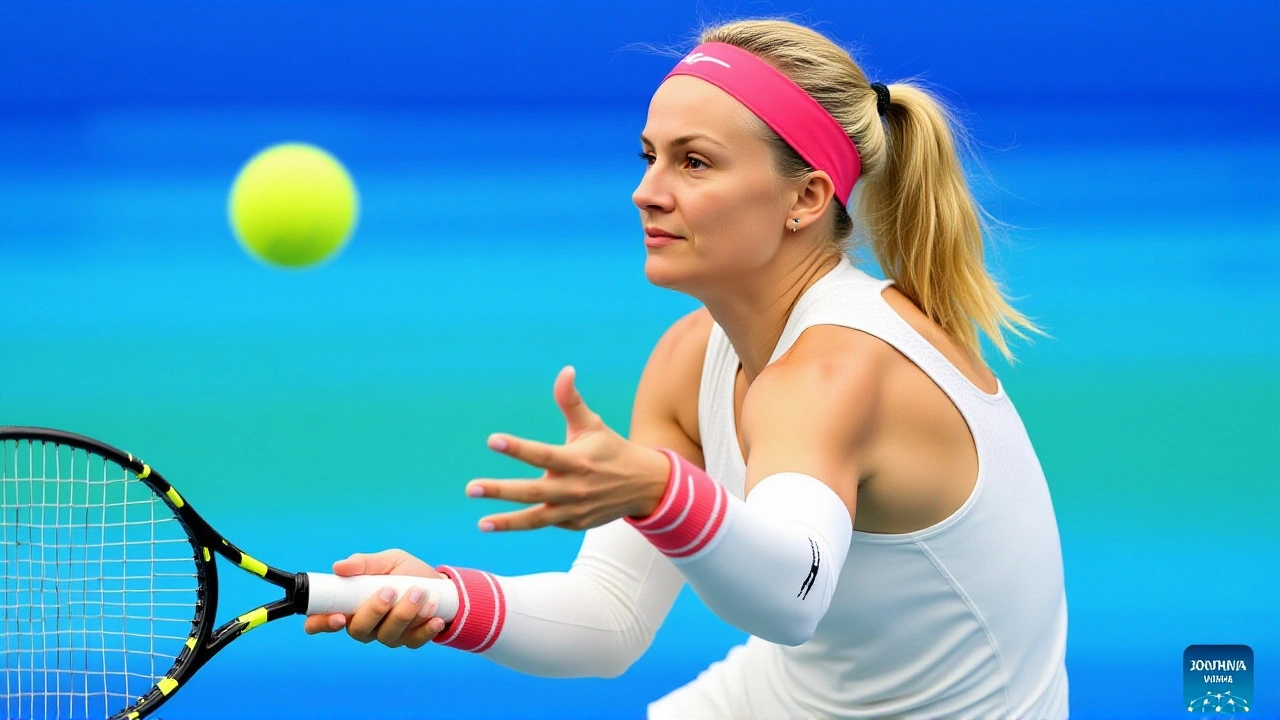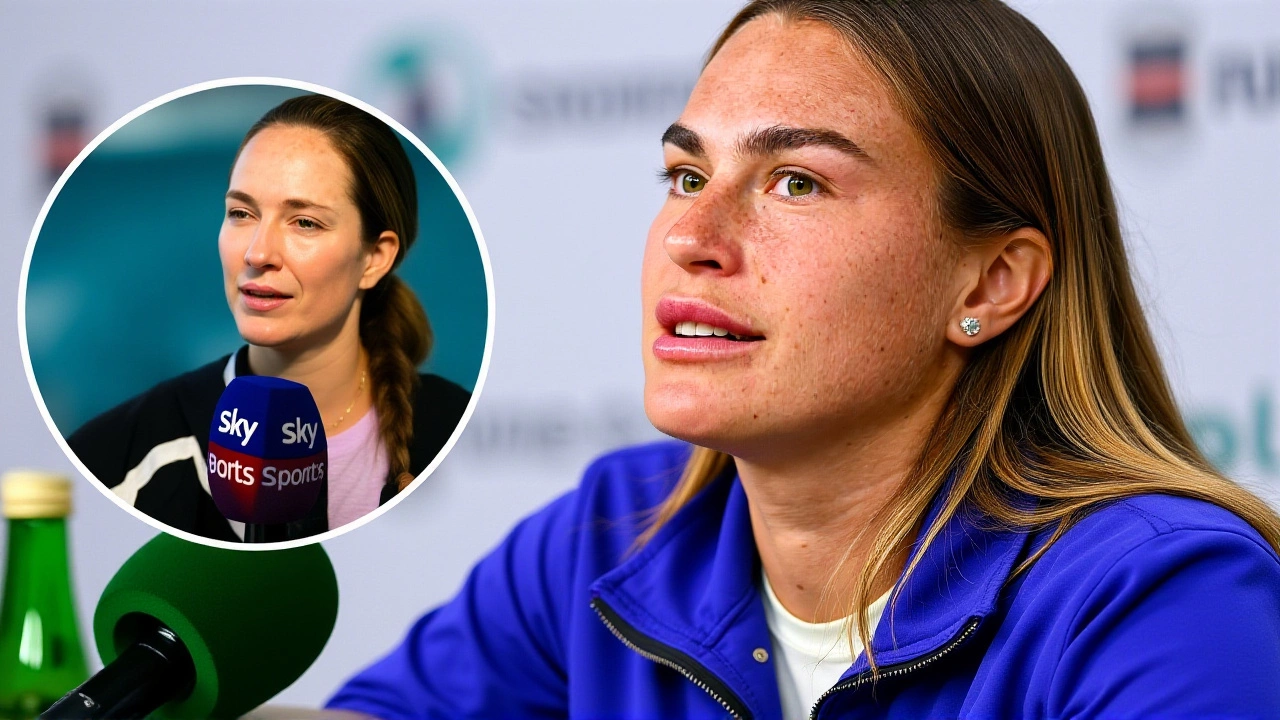When Coco Gauff, American lifted the trophy at Roland Garros on June 8, 2025, the tennis world buzzed not just over the victory but over the fallout from the defeated Aryna Sabalenka’s post‑match comments. The French Open final, broadcast to millions, ended 6‑7(5), 6‑2, 6‑4 in Gauff’s favor, delivering her first Grand Slam crown at 21.
Background: The 2025 French Open Final
The tournament, officially 2025 French OpenParis, France, saw Sabalenka enter as the world No. 1, a rank she’s held since September 2023. Gauff, seeded fourth, had cruised through the clay‑court draw, dropping only one set before the final. Their clash was billed as a classic power‑vs‑acuity showdown, and the stadium atmosphere was electric.
Both athletes earned substantial prize money – Sabalenka’s runner‑up check read $2.4 million, while Gauff took home $4.8 million, pushing her career earnings past $18.7 million according to the WTA’s June 10 release.
Sabalenka’s Controversial Remarks
In the immediate post‑match interview, Sabalenka, visibly shaken, said, "I think she won the match not because she played incredible but because I made all those mistakes." She added, "Iga Świątek would have beaten Gauff," referencing the Polish star, who is Iga Świątek and a two‑time French Open champion.
The comments sparked a firestorm on social media. Fans accused Sabalenka of diminishing Gauff’s achievement, while commentators pointed out that the Belarusian’s first‑set loss had already shifted momentum. Within hours, the Women's Tennis Association (WTA) issued a statement urging players to keep post‑match remarks respectful.
Three days later, on June 11, Sabalenka returned to the WTA media centre in Paris and apologized, calling her remarks “completely unprofessional” and blaming “the heat of the moment.” She explained that 14 consecutive tournaments leading up to Roland Garros had left her “physically and mentally exhausted.”
Danielle Collins Steps In
Former No. 7 Danielle Collins, now an ESPN analyst and USTA development coach, weighed in during an appearance on The Gay Tennis Podcast on October 7, 2025. Collins, who retired in 2024 after a career‑high Miami Open win, said, “Aryna Sabalenka was friggin’ tired,” emphasizing the grueling schedule that top players endure.
During the 22‑minute segment, Collins compared Sabalenka’s fatigue to her own experience winning the 2022 Miami Open over Świątek, noting, “I was embracing the moment in 2022 – emotions run high for all of us.” She added that athletes often speak “from the heart” when caught off‑guard, rather than delivering a rehearsed line.
Collins also highlighted the broader mental‑health pressures: “The extreme stress that elite tennis players face is real. It’s not just about the match; it’s about traveling, media, expectations – night and day.” Her remarks resonated with listeners, many of whom shared personal stories of burnout.

Community Reaction and Mental‑Health Initiative
The controversy spawned a bustling thread on Tennis Forum (created June 12, 2025, 09:15 CET). By October 8, the discussion logged 8,600 views and 185 replies, ranging from defending Sabalenka’s honesty to demanding stricter post‑match etiquette.
Amid the debate, the WTA announced on September 15, 2025 a new mandatory mental‑health briefing for all top‑20 players after Grand Slam finals, slated to debut at the 2026 Australian Open. The briefings will be led by licensed sports psychologists and aim to provide coping strategies for the intense post‑match spotlight.
- Goal: Reduce on‑court emotional spillover.
- Target group: Players ranked in the world top 20.
- Implementation: One‑hour session within 24 hours of a Grand Slam final.
- Funding: $2 million allocated from the WTA’s player‑wellness budget.
Critics argue that mandatory sessions could feel punitive, but many former pros, including Collins, applaud the move as a step toward normalizing mental‑health care in tennis.
What’s Next for the Players?
Gauff is expected to head to the grass‑court swing in Britain next month, where she’ll test her newfound confidence at Wimbledon. Sabalenka, meanwhile, has hinted at a brief rest period before returning to the hard‑court circuit in North America.
Both athletes will also feature in the upcoming WTA Finals in Cancun, where the new mental‑health briefings will be on trial. Observers will watch closely to see whether the policy eases tension or simply adds another layer of protocol.
Regardless of the outcome, the episode underscores how modern tennis is as much a psychological battle as a physical one. As Collins put it, “When you’re playing under the lights of Roland Garros, you’re not just battling an opponent; you’re battling your own mind.”
Frequently Asked Questions
How does this controversy affect Coco Gauff’s reputation?
The backlash was aimed primarily at Sabalenka, so Gauff’s win remains largely celebrated. However, some critics argue that the win will always be linked to the post‑match drama, prompting Gauff to address mental‑health topics in upcoming press conferences.
What led Aryna Sabalenka to make the remarks?
Sabalenka had played 14 straight tournaments, culminating in a five‑set, three‑hour final. Fatigue, media pressure, and the shock of losing the first set contributed to an impulsive interview where she blamed herself rather than Gauff’s play.
Why did Danielle Collins defend Sabalenka?
Collins highlighted the grueling schedule elite players endure and argued that emotional outbursts are natural after high‑stakes matches. She used her own 2022 Miami Open experience as a parallel to show that even champions can slip up verbally.
What are the key components of the new WTA mental‑health briefings?
The briefings include a one‑hour debrief with a licensed sports psychologist, discussion of coping strategies for media scrutiny, and a confidential questionnaire to track stress levels. They are mandatory for all players ranked in the top 20 after Grand Slam finals.
Will the controversy influence future player‑media protocols?
The WTA is already reviewing press‑conference guidelines, and several tournament directors have hinted at stricter media training for top players. The goal is to balance candidness with professionalism, reducing the chance of another heated outburst.
